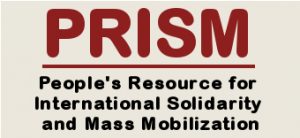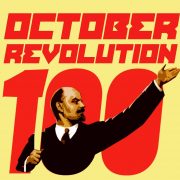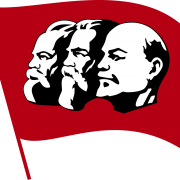Irina Malenko’s keynote speech (Topic 1) at the Amsterdam Conference
Irina Malenko, who was born and raised in the former Soviet Union, is author of Sovietica, a three-volume personal account of life in the ex-socialist country and in the West where she presently resides. She delivered the keynote speech address for Topic 1, “Achievements of the October Revolution” at the Amsterdam People’s Conference on the Continuing Validity of the Great October Socialist Revolution. The conference was held in Amsterdam, the Netherlands on 23-24 September 2017. This is the full text of his speech, with the PDF version attached at the end.
Life as a Soviet Person
By Irina Malenko
Keynote speech on Topic 1 of the study conference on the 100th anniversary of the October Revolution
Amsterdam, The Netherlands
September 23, 2017
I was born and grew up in the Soviet Union, but I did not realize the full meaning and the significance of this until my country and our socialist way of life were destroyed. It took me another few traumatic years to understand how really lucky I was and people of my generation that we were born in that place and at that time, and not elsewhere and later or much earlier. It took me some time to realize that I am still a Soviet person, despite the fact that my country no longer exists, and that I will always remain one.
 And that I now have a duty to fulfil: to tell the young generation about the reality of socialist way of life in the USSR and also to assist in every possible way the remaining socialist countries in the world as well as to help all those around the world who continue to fight for socialism. I see it as our sacred duty, because more than 20 years ago we did not defend our socialism properly and we have lost all our achievements. Because since then my country has betrayed and continues to betray even today all our traditional friends and allies in other countries, and somebody has to start to set things right.
And that I now have a duty to fulfil: to tell the young generation about the reality of socialist way of life in the USSR and also to assist in every possible way the remaining socialist countries in the world as well as to help all those around the world who continue to fight for socialism. I see it as our sacred duty, because more than 20 years ago we did not defend our socialism properly and we have lost all our achievements. Because since then my country has betrayed and continues to betray even today all our traditional friends and allies in other countries, and somebody has to start to set things right.
Writing a book about the ordinary Soviet socialist life of an ordinary Soviet person back in 2008-2009 was just the first step in it.1
I was born in the year when our Revolution celebrated its 50th anniversary. Nobody at that time could imagine even in their worst nightmare that within less than 25 years there would be no USSR anymore. Life was very calm and secure. I grew up as the only child of my parents in a middle-size industrial city, not far from Moscow.
My ancestors were all metal workers and weapon makers and our family lived in the same place for many generations. My parents’ generation became the first one to become engineers, thanks to the opportunities provided by the socialist revolution when your achievements depended totally on your own abilities and hard work. Before the Revolution, my grandmother’s elder brother had to start working at a factory at the age of 9. In my time, we could not even imagine such thing as child labour. By the time he became 17, he joined the Bolshevik party. But even before that, during the first Russian revolution in 1905, my great grandmother’s brothers took part in it. It is documented that they were arrested for smashing the windows of the house of the factory owner. Ten policemen escorted the two of them into another village, but on the way there they escaped, then returned back to the same house of the factory owner and continued to smash his windows!
I often think about them now, and their example inspires me to never give up and to struggle for what I believe in, no matter under what circumstances. Another revolutionary, Irishman Michael Collins used to say: “Why run when that’s what they expect?”
As a child, I dreamt of revolutionary heroes and of space travel. At that time, most of us wanted to be cosmonauts, and me too, I imagined myself to be a captain of a spaceship. None of us wanted to be photo models or pop stars. My mother, who is a very beautiful woman, was once offered to work for a Moscow fashion house as a model when she was in Moscow for her work. She became very offended and told those who came up with this offer: “I have a profession I enjoy, and you are offering me to become a clothes hanger?” She was head of the scientific information department at a big factory for more than 20 years after that.
Education and health care were free of charge and without any waiting lists, and we could not imagine any different way. Not just primary and secondary education, but even university education was free of charge. We were even getting 40 or 50 roubles per month to live on, which was sufficient for food, accommodation and study books. To give you an example, a place in a student house costs 24 roubles per year, including all bills, furnished room, with bedding that was changed free of charge every week, and even a tea kettle and a clothes iron.
Not only that it did not cost us anything, but the Soviet education was of very high quality and standards. I can compare because I studied in a Western university after that. In Northern Ireland, for example, it is a common thing that even people with university degree cannot show and name all European countries on a map. I had a colleague with two degrees who could not do that and was amazed that I easily can. We in the Soviet Union could not imagine any different. For us, education was not just a source of getting money. Knowledge was a matter of pride, regardless of how much you earn. That’s why most of us read so many books in our free time as well—and of course, also because books were very affordable!
Practicing sports or having access to culture in the broadest possible sense also was a very normal thing in our daily lives. Sometimes I hear from people in the West how they think that we allegedly lived “behind an iron curtain” and because of that we supposedly did not know any Western books, films or pop songs. But that wasn’t true either. In fact, we knew much more than most people in English-speaking capitalist countries know, because we also had access to a huge amount of the best films, books and songs from France, Italy, Spain, Greece, Eastern European countries and even African, Asian (India, Japan etc.) and Latin American countries. For example, Argentinian actress Lolita Torres was at some stage so popular that many girls were named after her. People in the USSR were singing some songs of the Japanese twins duo “Peanuts” (their songs were even translated into Russian) and were enjoying French films with Alain Delon, Louis de Funès, etc. Most people in the UK, US or Ireland have not even heard of any of them.
But of course, most importantly we had our own huge and very popular film industry (each republic had its own film studio!), great theatres (most of us knew many popular opera or operetta areas by heart) and great music. All the republics not only had schools with education in their own language, but also their own TV stations, newspapers, magazines, etc.
Public transport and housing were so cheap that they were close to being free. None of us ever had a worry that we could become homeless because of not being able to pay the house bills. Our constitution guaranteed all of us the right to work and the right for paid holidays as well. Those who worked in harsh conditions received various benefits and could retire earlier. It was forbidden by law to fire people without permission of a trade union.
It was forbidden for employers to force pregnant women to work on night shifts. The maternity leave was 18 months long, fully paid, and if you wished so, you could take another 18 months unpaid leave after that, with the right to return back to the same place of work. For working women, there were affordable kindergartens where the amount you paid depended on the amount of your salary; there were various after-school clubs, all free of charge, and of course, the pioneer summer camps. Women had the right to retire at 55, men at 60 (it is still so at the moment, but the current capitalist government constantly threatens to increase the pension age). Families with many children had priority in getting new housing and mothers with five or more children received medals of “mother hero” along with various extra benefits.
Trade unions owned a huge number of holiday homes and were able to provide trips to health resorts and to the Black Sea for their workers at a very low price. When I came to the Netherlands and went to study at university, I read in the study books here that in the USSR “trade unions did not exist” and that our women “only worked because their husbands did not earn enough money”. That was when I began to realize that people in the capitalist countries are being lied to about our socialism and that most of them do not really know anything about it, even though they are so sure that they do.
One of the main aspects of our socialist life was constant feeling of security, safety, feeling that you do not ever have to be afraid for what could happen to you and your family tomorrow. It is something that we perhaps did not value enough, simply because we did not know that it can be very different. There was no fear of unemployment, hunger, being attacked by criminals, being conned by swindlers, being sold to slavery, not being able to get medical treatment, and so on and so forth—all those things that became constant fear for the majority of our people in capitalist Russia today.
I could go into much more details, but then I would probably have to talk the whole day here and would not leave any time for other speakers. For those who are interested I can recommend to read my book.
Just a few words on how I came to write it. After having become what I call “the refugee of perestroika” and having been through various hardships in the capitalist world, such as poverty, debt, redundancy during pregnancy, unemployment, preventable disability and later untimely death of my daughter, various sorts of discrimination etc., I felt an urge to tell the people about life in the USSR and to compare it with life in the so-called “free” capitalist world—both to the young people in my native country who do not know what socialism was like and to the people abroad most of whom believe lies about it which they are told since childhood. That’s how another childhood dream of mine became a reality—I became a writer.
The results were very unexpected, in the sense that I did not even dream for my book to receive such big resonance, so many positive reactions, from people of all generations and from different countries and backgrounds. The book is freely available on the internet in Russian. It is also being translated and is already translated into several other languages. One of the most precious reactions for me is the reaction of my compatriots from my own generation and older: I was touched to tears when many of them came to thank me “for telling the truth for all of us”, “for finally saying loud what we all feel”, as they have told me.
Of course, a very important aspect of my book is also searching the answer to the burning question of how did this all happen, why did we allow it to happen to our country and to ourselves, what went wrong. I tried to describe this process as honest as I could too.
These days I am happy to see that the interest for socialism is growing strongly and rapidly among our young people. They have no personal experience of socialism and they grew up with so many lies about it. But the more lies they seem to hear, the bigger their interest to inquire about socialist reality becomes. Stalin’s popularity is also growing among all Russians, but particularly fast among young Russians. They are eager to know more and more about socialism, and I think my book came out at the right time. I could feel it when I met future journalists, students from Vladivostok.
Soviet people have a different set of norms and values than those which are being imposed on our youth today. We were brought up to support those who are in need; we take other people’s feelings into consideration and always try to take into account how our actions will affect others. We were also brought up in a spirit where “non-compromising” was a positive quality (as a person who stands up by his or her principles). Money or fame means nothing for us, feeling as we still do that we live to contribute to the society and to change the world for better. So, when we hear how the current “leaders” answer the question of what is the most important thing in life with statements like, “One has to live for one’s family” (instead of putting one’s country first!) or even worse, “Just life itself”, we can only despise them.
There is one post-Soviet song that described precisely and beautifully what went wrong with us during the perestroika years:
We attempted to see the sunrise
With our backs to the rising sun.
But we will not repeat the same mistakes again. It is our duty as Soviet people to support all those peoples of the world who have chosen the socialist path and have remained loyal to it. We can mention countries like Cuba and Venezuela. But in particular, I would like to mention our comrades in the DPRK2 who are being so strong and staunch in face of the imperialist threats today and who are being so enormously demonised by the capitalist media, even more than the USSR was. We have to tell the world the truth about the DPRK just as much as about the Soviet Union. They are at the frontline of defending socialism today and I would like to pay tribute to them for being such great inspiration and source of strength for all those in the world who stand up to the imperialist domination.When I visited Moscow the last few times, I always came to the statue of the Soviet war heroine Zoya Kosmodemyanskaya inside “Partizanskaya” metro station—also in order to seek strength and inspiration. I spoke with her in my mind. She was 18 when she was executed by the Nazis—in 1941 when it seemed that the USSR was on the losing side in the war, and she could not get her strength from our victories at the front. Yet, she remained strongly believing that the victory will inevitably be ours and she urged others to fight the enemy, not just sit and wait.
This is what we came to realize as a result of perestroika and the destruction of our socialist achievements, of all the capitalist barbarity we were plunged in: we cannot afford to “just sit and wait” till somebody defends or restores socialism for us. This is something all of us have to do ourselves, no matter how small or big our contribution will be. We just have to do our very best and overcome ourselves to make even the impossible possible, looking up at the heroes of the past and at those who defend socialism and those who fight for it today.
I would like to thank sincerely our comrades especially from the Philippines for giving me this opportunity to speak to you today. I am very proud to be your friend and comrade, and your struggle is one of the great sources of inspiration for all of us who came here today. ■
![]() Download as PDF file: ORCC-Amsterdam-02-Malenko-final
Download as PDF file: ORCC-Amsterdam-02-Malenko-final
1Sovietica is a three-volume semi-autobiographical book reflecting the author’s experiences and insights about life and growing up in the former Soviet Union as a young woman. It has been translated into English and is available commercially, while the original Russian is freely available online.
2Democratic People’s Republic of Korea




Leave a Reply
Want to join the discussion?Feel free to contribute!